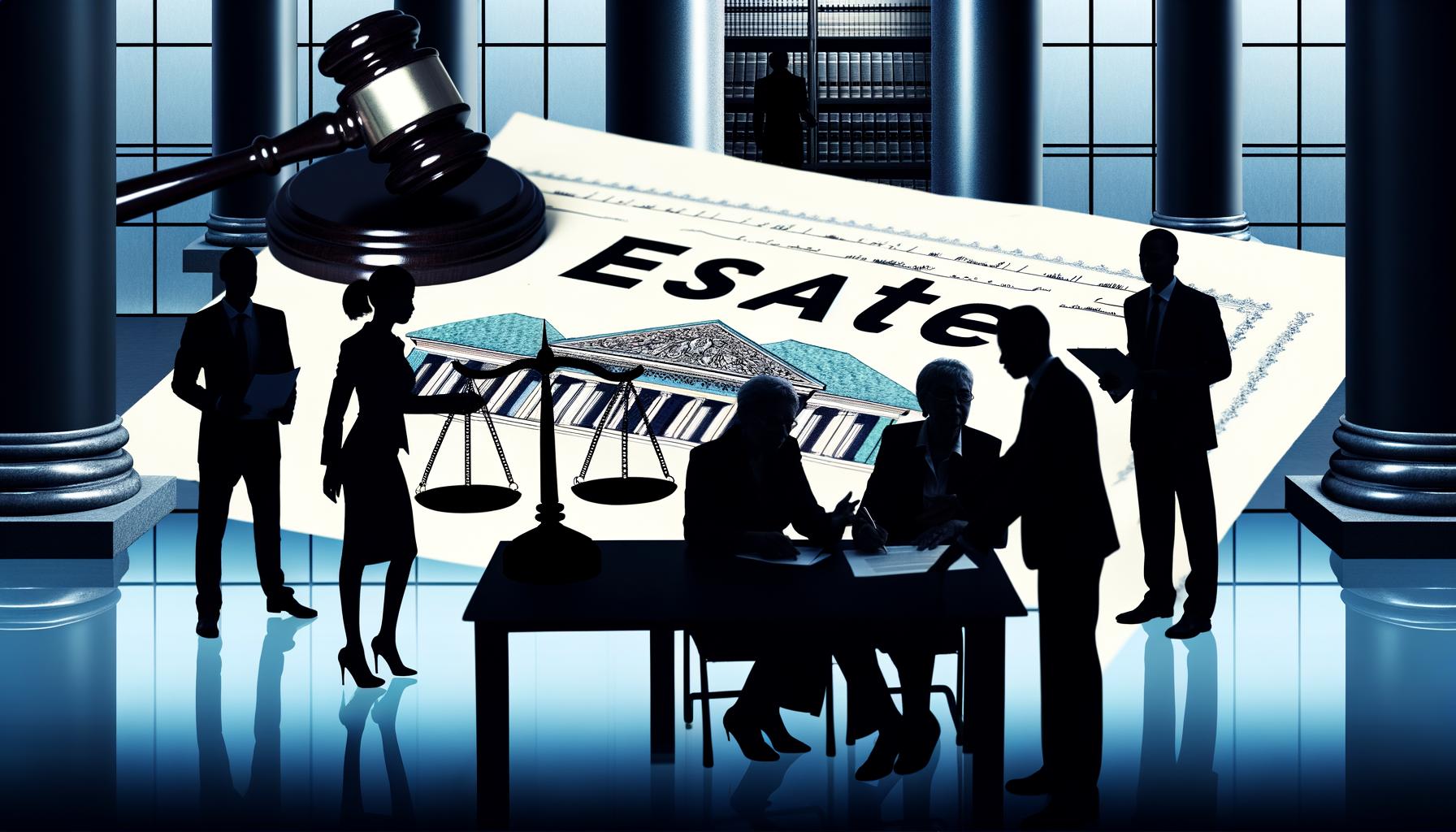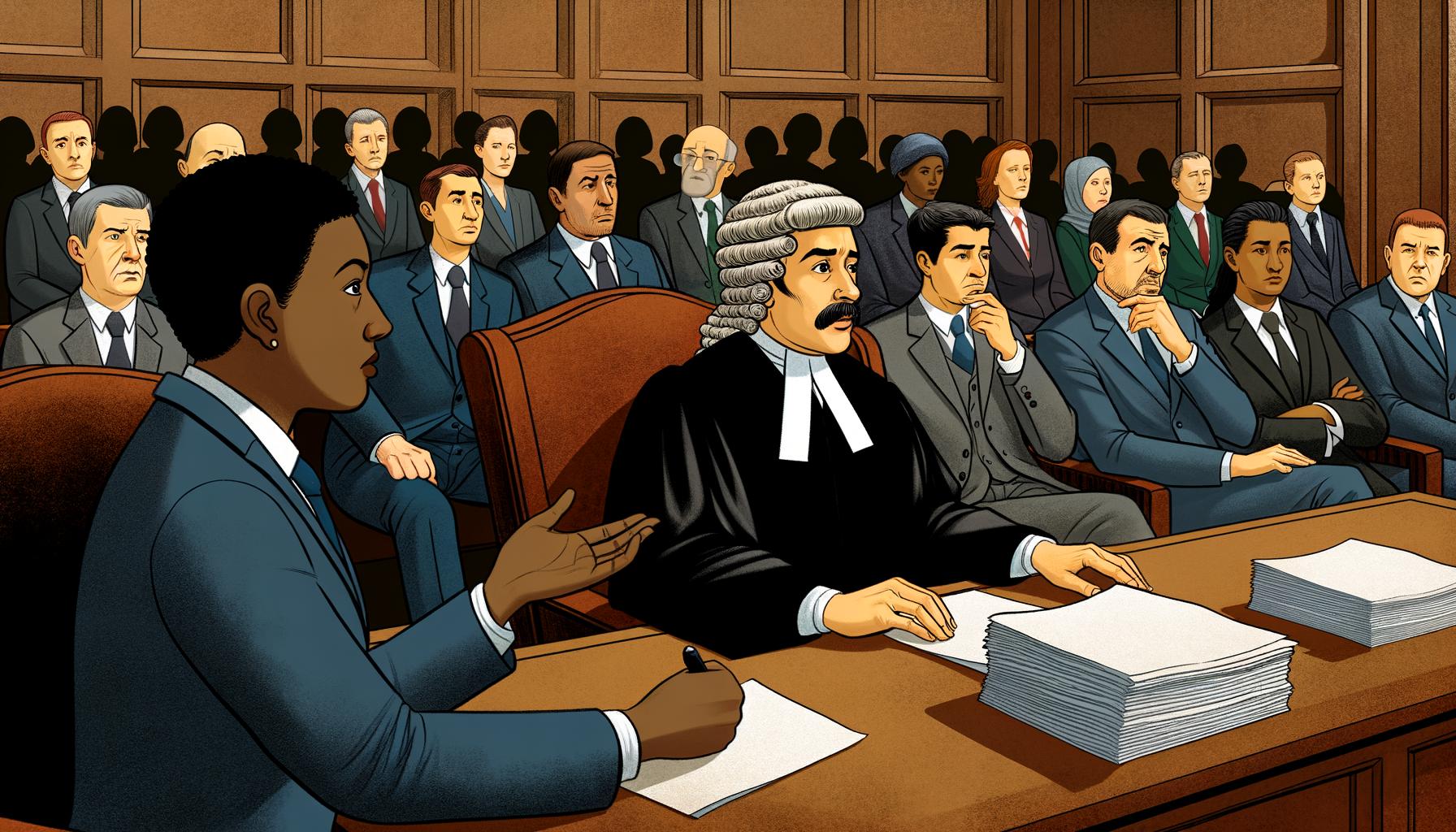Estate litigation is an intricate and often emotionally charged area of law that can significantly affect families, especially in communities like Villa Park. Understanding the nuances of estate litigation is crucial for those who find themselves navigating these challenging legal waters. Estate disputes do not only deal with the division of assets; they also touch upon deep-seated family dynamics, long-standing relationships, and sometimes irreparable rifts between loved ones.
In Villa Park, where community ties and family bonds are deeply valued, understanding how estate litigation impacts families becomes even more essential. This article aims to shed light on the various aspects of estate litigation and its repercussions on Villa Park residents. From defining what estate litigation entails to outlining common causes and exploring both emotional and financial impacts, we will cover each facet to provide a comprehensive understanding.
Moreover, this blog will offer guidance on preventing such disputes through proactive measures and highlight local resources available for familial support during these tough times. Whether you are dealing with a will contest or facing beneficiary disagreements, being informed can make a significant difference in managing and potentially avoiding protracted conflicts. Join us as we explore the complexities of estate litigation and its effects on families in Villa Park.
What Is Estate Litigation?
Estate litigation is a legal process that involves the resolution of disputes over the distribution and management of a deceased person’s assets. Unlike other types of legal disputes, estate litigation specifically focuses on issues arising from wills, trusts, and other estate planning documents. This often involves multiple parties who may have conflicting interests in the estate, including family members, beneficiaries, executors, and trustees.
Differences From Other Legal Disputes
Unlike criminal or civil cases that deal with violations of law or personal injuries, estate litigation centers around the interpretation and enforcement of a deceased person’s wishes as outlined in their estate plan. One key distinction is that these disputes often occur within the confines of probate court rather than regular civil or criminal courts. Additionally, the unique emotional complexities involved-since they frequently involve disputes among family members-render them distinct from purely commercial or contractual legal battles.
Common Causes
Several common causes can lead to estate litigation. Will contests are perhaps the most frequent type of dispute; these typically arise when family members question the validity of a will due to possible undue influence, fraud, or incapacity at the time it was created.
Fiduciary disputes occur when there is disagreement over how an executor or trustee has managed the estate’s assets. Beneficiary disagreements are also quite prevalent-these usually involve conflicts about who should receive which assets or how much each beneficiary is entitled to under the terms of a will or trust.
Understanding these different facets helps Villa Park families better prepare for potential conflicts that could arise during what is already a difficult time emotionally and financially. Sharing this knowledge proactively can significantly reduce stress and help ensure smoother transitions when dealing with loved ones’ legacies.
The Common Causes of Estate Litigation in Villa Park
Estate litigation can become a necessity for families in Villa Park due to a variety of common scenarios. One frequent cause is the contesting of wills. When a family member believes that a will does not accurately reflect the decedent’s wishes, perhaps due to perceived undue influence or the decedent’s mental incapacity at the time it was made, litigation can ensue.
These disputes often involve allegations that external pressures influenced the decedent’s decisions or that the document lacks proper legal standing. Such contests can bring deeply buried family conflicts to light, intensifying emotional tensions.
Another significant cause of estate litigation in Villa Park is disputes over trusts. Trusts are designed to facilitate a smoother distribution of assets, but they can sometimes lead to contention, especially when there are ambiguities or changes made late in life.
Disagreements may arise regarding the interpretation of trust documents, management of assets by trustees, and dissatisfaction among beneficiaries with how funds have been allocated. Trust-related conflicts often require detailed scrutiny and can be just as contentious as will contests.
Beneficiary disagreements also fuel estate litigation within this community. Family members might disagree on how certain assets should be distributed, especially if there are questions about promises allegedly made by the deceased or discrepancies between verbal declarations and written documents.
Additionally, familial relationships can compound these tensions-step-siblings and half-siblings might have different expectations which could lead to prolonged litigation battles. In many cases, both financial interests and deep-seated emotional histories contribute heavily to why these disagreements turn into full-blown legal disputes.

The complexities surrounding estate litigation underscore the need for meticulous estate planning and clear communication among all involved parties. Understanding these common causes helps families in Villa Park proactively address potential issues before they necessitate legal intervention.
- Will contests
- Trust disputes
- Beneficiary disagreements
- Perceived undue influence
- Interpretation of documents
- Familial relationships
The Legal Process
Understanding the legal process of estate litigation is crucial for families in Villa Park who find themselves embroiled in such disputes. Estate litigation typically begins with the filing of a petition in probate court. This document sets forth the nature of the dispute, such as challenging the validity of a will or questioning the actions of an executor. Once initiated, all named beneficiaries and interested parties are notified, giving them an opportunity to respond to the claims presented.
The Role of Probate Courts and Legal Representatives
Probate courts play a central role in adjudicating estate disputes. The judge reviews evidence, hears testimonies from those involved, and makes rulings based on applicable laws and statutes. During this process, each party will usually be represented by legal counsel whose job is to advocate on behalf of their clients’ interests. In some instances, mediation may be recommended as an alternative approach to resolving disagreements outside of courtrooms.
Legal representatives bear the task of navigating complex issues inherent in estate litigation. This includes gathering relevant documents like wills or trust records, deposing witnesses who can shed light on contested matters, and filing necessary motions and briefs that outline their arguments. Their goal is not just to resolve financial questions but also address emotional grievances that family members might have against one another.
Timeline and Costs Associated With Estate Litigation
The timeline for estate litigation can vary significantly depending on the complexity of the case. Simple disputes might take a few months to resolve; more complicated situations could drag on for years. Lengthy litigation periods often exacerbate existing tensions within families, making timely resolution even more critical.
Financially, families should prepare for significant expenses associated with estate litigation. Legal fees can add up rapidly, depending both on hourly rates charged by attorneys and additional costs related to court filings or expert witness testimonies. There may also be direct financial implications stemming from contested assets remaining tied up until a judicial decision is rendered-potentially diminishing their value over time.
Being informed about these steps can help Villa Park families navigate through estate litigations effectively while minimizing emotional strain and financial losses they might otherwise endure during prolonged legal battles.
Emotional and Financial Impact on Families
Estate litigation can have profound emotional consequences for families in Villa Park. The process of disputing a loved one’s estate can often resurface old conflicts and create new rifts among family members. When disagreements over inheritance arise, it can lead to deep-seated resentment and loss of trust within the family unit.
Emotional stress is compounded by the fact that these disputes often occur during a period of mourning, when emotions are already running high. This combination can result in long-lasting emotional scars and strained family relationships that may take years to heal, if they do at all.
Financially, estate litigation can impose a significant burden on the involved parties. Legal fees associated with estate disputes can be astronomical, quickly depleting the very assets that are being disputed. Families may find themselves spending more money on legal representation than they stand to gain from their share of the inheritance.
Additionally, there could be costs related to court proceedings and other administrative expenses that further drain financial resources. This financial strain not only takes away from potential inheritances but also places additional pressure on surviving family members who may already be dealing with economic instability after the loss of a loved one.
These emotional and financial pressures often deter families from engaging in estate litigation altogether or push them to settle outside of court under less favorable conditions. To illustrate this point, consider a hypothetical example: A father passes away without clear instructions in his will about how his assets should be divided among his three children.

The ambiguity leads to a legal battle where each sibling incurs thousands of dollars in legal fees and endures heightened stress and sleepless nights due to familial tension. In some cases like this, the cost might outweigh any potential gain from the disputed estate.
| Emotional Impact | Financial Impact |
|---|---|
| Resentment & Loss of Trust | High Legal Fees |
| Stress During Mourning | Court & Administrative Costs |
| Strained Relationships | Economic Instability Post-Loss |
How to Prevent Estate Litigation
Preventing estate litigation begins with comprehensive and clear estate planning. Families in Villa Park should prioritize creating a legally sound estate plan that accounts for all assets, wishes, and contingencies. This involves drafting a will, setting up appropriate trusts, and designating beneficiaries clearly.
One effective strategy is to review your estate plan regularly with the assistance of an experienced attorney who specializes in estate law. Regular updates ensure that the documents reflect current wishes and account for any new laws or changes in family circumstances.
To further minimize the risk of disputes, open communication within the family is crucial. Many disputes arise from misunderstandings or surprises regarding inheritance decisions. By having honest conversations with potential heirs about your intentions and the reasons behind specific choices, you can reduce confusion and resentment later on. Consider holding family meetings where everyone can ask questions and get clarifications directly from you while you’re still alive to provide answers.
Additionally, consider utilizing mediation as a tool for resolving conflicts that may arise even before they escalate into full-blown estate litigation. Engaging in mediation allows families to address disagreements in a controlled environment under professional guidance, which can help maintain relationships while resolving issues amicably. This prevents costly legal battles that not only deplete the estate’s value but also strain familial bonds irreparably.
- Draft a thorough estate plan with your attorney.
- Regularly review and update your will and other legal documents.
- Hold family meetings for transparent discussions around inheritance intentions.
- Consider mediation as an early intervention method for conflicts.
Seeking professional legal advice is indispensable when navigating these waters. Involving an experienced lawyer right from the beginning ensures that no details are overlooked and provides peace of mind knowing all legal bases are covered efficiently. By taking these proactive steps, Villa Park families can better safeguard their estates against potential litigation, ensuring smoother transitions and preserving family harmony during difficult times.
Local Resources and Legal Help in Villa Park
In Villa Park, there are numerous resources available to families grappling with the complexities of estate litigation. Local law firms that specialize in estate litigation can provide invaluable guidance and representation.
These firms typically have experienced attorneys who understand the nuances of local laws and can offer personalized advice tailored to each family’s unique situation. Engaging a specialized attorney not only helps in navigating the legal maze but also ensures that your representation is well-versed in the specific challenges that may arise in Villa Park.
Additionally, community support groups can play a crucial role for those going through the emotionally taxing process of estate litigation. Organizations such as family counseling services offer support to individuals dealing with grief and conflict arising from estate disputes. Having emotional support can mitigate some of the stress associated with these disputes, enabling family members to handle their responsibilities more effectively.
Local probate courts are another essential resource for families involved in estate litigation. The probate court system is designed to resolve issues related to wills, trusts, and estates efficiently. These courts often provide self-help resources and sometimes even legal aid services for those who qualify. By utilizing these resources, families can gain a clearer understanding of what they need to do legally and what options are available to them.
| Resource | Description |
|---|---|
| Local Law Firms | Specialize in estate litigation; provide tailored legal advice. |
| Community Support Groups | Offer emotional support during stressful estate disputes. |
| Probate Courts | Resolve issues related to wills, trusts, and estates; provide self-help resources. |
Understanding these local resources empowers Villa Park families facing estate litigation, helping them manage both legal intricacies and emotional hurdles more efficiently. By leveraging professional legal help and community support structures, it becomes possible to navigate this challenging period with greater clarity and confidence.
Conclusion
Understanding estate litigation and its complexities is crucial for families in Villa Park. The emotional and financial strain brought about by these disputes can leave lasting scars, making it imperative to address potential issues proactively. By gaining a thorough understanding of what estate litigation entails and the common scenarios that lead to it, Villa Park families can better prepare themselves to navigate these challenges.

Preventive measures are key in avoiding the pitfalls of estate litigation. Clear and legally binding estate planning cannot be understated; ensuring that wills, trusts, and beneficiary designations are transparent can significantly reduce the likelihood of future disputes.
Encouraging open communication within the family about estate intentions can help in aligning expectations and mitigating surprises that often serve as a catalyst for litigation. Moreover, seeking professional legal advice during the estate planning process provides an additional layer of security, as experts can offer tailored solutions equipped to handle unique family dynamics.
For those already embroiled in or anticipating estate litigation, local resources are available to provide support. Whether it’s law firms specializing in estate matters or community programs offering counseling services, Villa Park families do not have to face these issues alone.
Taking decisive action by consulting professionals ensures not only the proper handling of legal disputes but also lends peace of mind during emotionally turbulent times. For these reasons, prioritizing both sound legal counsel and strong familial bonds is highly recommended for anyone dealing with or hoping to prevent estate-related conflicts.
Frequently Asked Questions
What Is a Litigation Guarantee in Real Estate?
A litigation guarantee in real estate refers to a commitment provided by one party, typically a guarantor, to assume responsibility for certain obligations or disputes that may arise during or after a real estate transaction. This guarantee acts as a safeguard against potential lawsuits that could affect the ownership, use, or transfer of the property.
The purpose is to provide peace of mind and financial security to parties involved in the transaction by ensuring that any legal issues will be resolved without causing significant losses.
Why Is My Mortgage in Litigation?
If your mortgage is in litigation, it generally means there is an ongoing legal dispute related to your mortgage agreement. This might occur due to various reasons such as foreclosure proceedings initiated by the lender due to non-payment, disputes over terms and conditions of the loan, allegations of predatory lending practices, or issues relating to property title and ownership.
Ultimately, having your mortgage in litigation indicates that a court will need to intervene to resolve these matters.
What Is a Relator in Litigation?
In litigation, especially within legal terminology associated with qui tam actions under the False Claims Act, a relator is a private individual who brings forth information regarding fraudulent activities against the government on behalf of the state or federal government.
In essence, this person acts as a whistleblower and can potentially receive financial rewards if their information leads to successful recovery by the government of defrauded funds.
What Does Guarantee Mean in Real Estate?
In real estate, a guarantee serves as an assurance by one party—often involving financial or performance aspects—that specific conditions or obligations will be met within a transaction. For instance, this could involve guaranteeing clear title to land free from encumbrances or promising certain work standards in property development projects.
Guarantees provide confidence and security for parties involved since they outline remedies if predefined commitments are not fulfilled.
What Is the Difference Between a Legal Guarantee and a Warranty?
The primary difference between a legal guarantee and a warranty lies in their scope and application within transactions or contractual agreements.
A legal guarantee refers broadly to assurances made by one party concerning specific outcomes or responsibilities; it encompasses commitments about product quality (like guarantees of title) but might also extend further into other guarantees not necessarily tied directly with purchase contracts—such as third-party guarantees ensuring debt repayment compliance on loans/deeds/mortgages etc., while wary applies more narrowly towards providing repairs/replacement/refund coverage limited usually only towards manufactured good deliveries/services sold consumer basis specifically focusing onto protection buyer interest against defects damage occurring post-sale domestically household settings than commercial purposes separately legally defined fixed timeframes enforceable judicially interpretations contexts differentially nuanced depending jurisdictions laws implications combined practicalities end-user perspectives assembling overall stance difference understand vice-versa application interpretations practice fields naturally evolving pragmatically integrated contextually relatively expanding dynamics under practical realities thereby necessitating continued evaluations through instances concerned stakeholder interactions evaluating evolved holistic constructs surrounding contemporary nuanced understandings evolving jurisprudence subjectively experienced dimensionally varying perceptions accordingly inherently considered dynamic field practicality mentioned accordingly central guiding focal continuously evolving manner addressed contingently adopting relevant measures appropriately dynamically pragmatically context-based.

